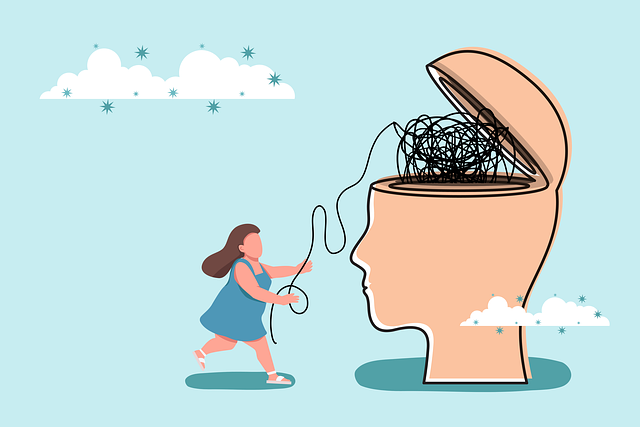Cognitive Behavioral Therapy (CBT) is an evidence-based form of talk therapy that equips individuals with tools to manage anxiety, depression, and other mental health issues by changing negative thought patterns. Certified CBT psychotherapists undergo specialized training to help clients challenge irrational beliefs, learn practical coping strategies, and improve their overall well-being. This effective approach, backed by extensive research, is versatile and successfully treats various conditions from depression to PTSD, making it a valuable asset in modern mental health care. When seeking CBT therapy, choose a qualified professional with strong credentials, empathy, and clear communication who aligns with your needs and preferences.
Discover the transformative power of Cognitive Behavioral Therapy (CBT) through this comprehensive guide. We explore how CBT certified psychotherapists play a pivotal role in helping individuals overcome challenges, from anxiety and depression to phobias and trauma. This article delves into the evidence-based approach of CBT, its key techniques, and real-life applications. Learn about the qualifications needed to become a CBT therapist, and find tips for locating reputable professionals. Uncover why CBT is a game-changer in mental health treatment.
Understanding CBT Therapy: A Brief Overview

CBT, or Cognitive Behavioral Therapy, is a highly effective form of talk therapy that focuses on identifying and changing negative thought patterns and behaviors. It’s a structured approach that empowers individuals to take control of their mental health. By understanding the connection between thoughts, feelings, and actions, CBT helps people challenge and reframe unhelpful cognitive distortions, leading to improved emotional well-being.
This therapeutic method encourages active participation from clients, teaching them practical strategies to manage symptoms associated with anxiety, depression, and various other mental health concerns. Through a series of sessions, psychotherapists guide individuals through a process of self-reflection, helping them gain insights into their thinking and behavior, ultimately fostering resilience and promoting positive change.
The Role of CBT Certified Psychotherapists

CBT certified psychotherapists play a pivotal role in modern mental health care, specializing in Cognitive Behavioral Therapy (CBT), a highly effective form of psychotherapy. Their expertise lies in helping individuals identify and change negative thought patterns and behaviors that contribute to various psychological disorders. By facilitating a collaborative relationship with clients, these therapists guide them through the process of understanding their thoughts, emotions, and actions, empowering them to make positive shifts in their lives.
Through structured sessions, CBT certified psychotherapists teach clients practical skills to manage symptoms, prevent relapse, and improve overall well-being. They assist folks in navigating challenging situations, fostering resilience, and cultivating healthier coping mechanisms. This evidence-based approach has proven successful in treating depression, anxiety disorders, post-traumatic stress disorder (PTSD), and more, making CBT certified psychotherapists invaluable assets in the quest for mental wellness.
Qualifications and Training for CBT Therapists

CBT certified psychotherapists undergo specialized training and education to become experts in Cognitive Behavioral Therapy (CBT). This evidence-based approach focuses on identifying and changing negative thought patterns and behaviors, empowering individuals to manage their mental health effectively. The journey to becoming a CBT therapist involves completing an advanced degree in psychology or a related field, such as a Master’s or Doctorate. During their academic pursuit, future therapists learn about the theoretical foundations of CBT, including its history, key principles, and various therapeutic techniques.
Practical training is a vital component of this process, where aspiring CBT therapists gain hands-on experience through internships, clinical rotations, or supervised practice settings. They work alongside experienced professionals, refining their skills in assessing clients, designing personalized treatment plans, and employing cognitive restructuring, behavioral activation, and exposure therapy techniques. Continuous professional development through workshops, seminars, and ongoing supervision ensures that CBT certified psychotherapists stay updated with the latest research and best practices in their field.
Benefits of CBT: Evidence-Based Approaches

CBT, or Cognitive Behavioral Therapy, is an evidence-based approach that has proven effective in treating a wide range of mental health conditions. One of its key strengths lies in its ability to empower individuals by teaching them to identify and challenge negative thought patterns and behaviors, fostering a more positive and adaptive mindset. This therapy technique encourages active participation, making it an engaging process for clients.
The benefits of CBT are well-documented, with numerous studies supporting its effectiveness. It offers a structured framework that enables psychotherapists to tailor treatments to individual needs, ensuring focused and goal-oriented sessions. By helping people manage symptoms and gain insights into their thought processes, CBT provides long-lasting coping strategies. This evidence-based method has been shown to enhance overall well-being, improve mood, and increase resilience, making it a valuable tool in the arsenal of certified psychotherapists.
Common Techniques Used in CBT Sessions

In CBT sessions, therapists employ a variety of techniques designed to help clients identify and change negative thought patterns and behaviors. One common method is cognitive restructuring, where therapists assist individuals in challenging and replacing irrational beliefs with more realistic and positive ones. This involves exploring thoughts, feelings, and behaviors together, identifying distortions, and developing balanced perspectives.
Another key technique is problem-solving, focusing on practical solutions to everyday challenges. Therapists guide clients through a structured process of defining problems, generating options, evaluating outcomes, and implementing solutions. Exposure therapy is also used, particularly for anxiety disorders, where individuals gradually confront feared situations in a safe environment to reduce anxiety over time. Through these techniques, CBT therapy empowers clients to take control of their mental health and well-being.
Finding a Reputable CBT Certified Therapist

When seeking a CBT certified therapist, it’s crucial to prioritize your well-being and invest time in finding the right professional. Start by checking the therapist’s credentials and certifications from recognized bodies to ensure they have undergone the necessary training in Cognitive Behavioral Therapy. Online reviews and testimonials from previous clients can offer valuable insights into their effectiveness and approach. Look for a therapist who not only possesses the certification but also demonstrates empathy, active listening skills, and a willingness to collaborate with you in your journey towards healing.
Reputable therapists often have clear communication about their services, fees, and expectations. They should provide information on their experience, areas of specialization within CBT therapy, and any specific techniques they use. A good fit is essential for building trust and fostering an effective therapeutic alliance. Consider factors like the therapist’s location, availability, and whether sessions align with your schedule to ensure a smooth and beneficial experience in your CBT therapy journey.
Real-Life Applications of CBT Therapy

CBT therapy has a wide range of real-life applications, making it one of the most versatile and effective therapeutic approaches. It is commonly used to treat various mental health disorders such as depression, anxiety, post-traumatic stress disorder (PTSD), eating disorders, and obsessive-compulsive disorder (OCD). By focusing on identifying and changing unhelpful thought patterns and behaviors, CBT helps individuals manage their symptoms and improve their overall well-being.
In everyday scenarios, CBT can assist people in dealing with stress, improving work performance, enhancing relationships, and even managing chronic physical health conditions. It empowers individuals to take control of their lives by teaching them practical coping strategies and problem-solving skills. This evidence-based therapy has been extensively researched and proven effective in numerous studies, solidifying its place as a go-to treatment option for many mental health concerns.
